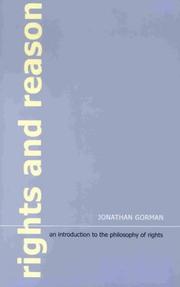| Listing 1 - 3 of 3 |
Sort by
|

ISBN: 1902683730 1902683749 9781844653461 1844653463 9781317489351 1317489357 1282921479 9781282921474 9781902683744 1317489349 9781317489344 1315710579 9781315710570 9786612921476 6612921471 9781317489337 9781902683737 Year: 2003 Publisher: Chesham: Acumen,
Abstract | Keywords | Export | Availability | Bookmark
 Loading...
Loading...Choose an application
- Reference Manager
- EndNote
- RefWorks (Direct export to RefWorks)
In Rights and Reason Jonathan Gorman sets discussion of the 'rights debate'; within a wide-ranging philosophical and historical framework. Drawing on positions in epistemology, metaphysics and the theory of human nature as well as on the ideas of canonical thinkers Gorman provides an introduction to the philosophy of rights that is firmly grounded in the history of philosophy as well as the concerns of contemporary political and legal philosophy. The book gives readers a clear sense that, just as there are arguments about the content of rights, and just as there are myriad claims to rights, so there are pluralities of theories of rights that offer some understanding of the moral and legal realm and of the place rights may hold within it. Gorman argues that in a pluralist context of inconsistent rights we require pragmatic procedures rather than universal principles of justice to resolve conflicting claims.
Human rights --- Ethics. --- Reason. --- Philosophy. --- Civil rights --- Mind --- Intellect --- Rationalism --- Deontology --- Ethics, Primitive --- Ethology --- Moral philosophy --- Morality --- Morals --- Philosophy, Moral --- Science, Moral --- Philosophy --- Values --- Human rights - Philosophy.

ISBN: 0776627015 0776617370 9780776617374 9780776627014 0776603558 Year: 1992 Publisher: Les Presses de l’Université d’Ottawa | University of Ottawa Press
Abstract | Keywords | Export | Availability | Bookmark
 Loading...
Loading...Choose an application
- Reference Manager
- EndNote
- RefWorks (Direct export to RefWorks)
Has any question about the historical past ever been finally answered? Of course there is much disagreement among professional historians about what happened in the past and how to explain it. But this incisive study goes one step further and brings into question the very ability of historians to gather and communicate genuine knowledge about the past.Understanding History applies this general question from the philosophy of history to economic history of American slaveholders. Do we understand the American slaveholders? Has the last word on the subject been said? Both the alleged “profitability” of slavery and the purported causes of the American Civil War are philosophically analyzed. Traditional narrative history and econometric history are examined and compared, and their different philosophical assumptions made explicit. The problem of justifying historical methodologies is first set in the wider context of the philosophical problem of knowledge, then lucidly explained and resolved along pragmatic lines. The novelty of Gorman’s approach lies in its comparison of narrative with econometric history, its analysis of empathetic understanding in terms of cost-benefit analysis, and its elucidation of the metaphysical presuppositions of empiricism. It stands out especially for the clarity, rigor, and simplicity of its arguments.
History --- Historiography. --- Philosophy. --- Historical criticism --- History, Modern --- Authorship --- Criticism --- Historiography --- Philosophy --- Historiographie. --- Histoire --- Philosophie. --- Economics --- History. --- hisotriography --- history --- philosophy
Book
Year: 2007 Publisher: Malden (MA): Blackwell,
Abstract | Keywords | Export | Availability | Bookmark
 Loading...
Loading...Choose an application
- Reference Manager
- EndNote
- RefWorks (Direct export to RefWorks)
| Listing 1 - 3 of 3 |
Sort by
|

 Search
Search Feedback
Feedback About UniCat
About UniCat  Help
Help News
News